All the fun a Puritan can stand
© Christy K. Robinson
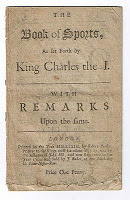 In 1618, King James of England published The Book of Sports, a pamphlet that promotedrecreation on Sundays after church services. Most English people worked 12 ormore hours per day, six days a week. Puritan worship practices were to attendservice for hours in the morning, have a lunch break, and then sit for two ormore hours through more teaching and preaching before going home. Servants ofPuritan masters were oppressed with no leisure time, no recreation, no timeaway from their employers. In 1632, James' son, King Charles I, with thesupport of William Laud, Archbishop of Canterbury, reissued
The Book of Sports
,but with the injunction that it be read aloud in all churches, or the ministerswould be deprived of income, and probably imprisoned. "People are governed bythe pulpit more than the sword," said King Charles in 1638.
In 1618, King James of England published The Book of Sports, a pamphlet that promotedrecreation on Sundays after church services. Most English people worked 12 ormore hours per day, six days a week. Puritan worship practices were to attendservice for hours in the morning, have a lunch break, and then sit for two ormore hours through more teaching and preaching before going home. Servants ofPuritan masters were oppressed with no leisure time, no recreation, no timeaway from their employers. In 1632, James' son, King Charles I, with thesupport of William Laud, Archbishop of Canterbury, reissued
The Book of Sports
,but with the injunction that it be read aloud in all churches, or the ministerswould be deprived of income, and probably imprisoned. "People are governed bythe pulpit more than the sword," said King Charles in 1638. This was a serious blow to Puritans (as it was meant to be),and it sparked the Great Migration to New England.When Rev. John Cotton refused to comply, he went into hiding for a year beforehis emigration, and ten percent of the citizens of Boston,Lincolnshire, followed his flight to New England.
'Puritans' opposition to sport wasgrounded on at least seven propositions: sport was frivolous and wasted time;sport did not refresh the body as good recreation should, but tired peopleinstead; much sporting activity was designed deliberately to inflict pain or injury;sporting contests usually led to gambling; more sport took place on Sunday thanon any other day, so, sport encouraged people to defile the Sabbath; sport wasnoisy and disrupted others, sometimes entire communities; and many sports hadeither pagan or "Popish" origins.' ~Bruce C. Daniels, Puritansat Play , p. 166.
America'sPuritan colonists in the 17th century were opposed to ball sports because ofthe risk of injury and betting. They forbade blood sports (dog fights,bear-baiting, cock fighting), not so much from concern about animal cruelty, butbecause of the gambling attached to them. They condemned theater(cross-dressing because men played women's parts, and sexual immorality)and organ music in church (distracted from Bible reading and preaching,inflamed the senses toward the emotional rather than the intellectual).
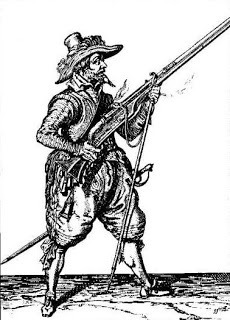
American Puritans approved of hunting, marksmanship, wrestling,and fishing. Their militia drill days were festivals in manly pursuits ofwarfare, and womanly cooking and marketing of home products.
What did New England womendo for sport? Quilting, spinning, and sewing bees were productive and a greattime for laughing and talking. There were speed-spinning competitions. Some sewingbees would have been occasion for the Bible studies that Anne Hutchinson got introuble for, in mid-1630s Boston.
At home with the family, they loved reading aloud in theevening. At first, the books of choice were the Geneva Bible and Foxe's Book ofMartyrs, but soon, books and broadsheets were shipped to Boston, and sold, traded, loaned, and readover and over.
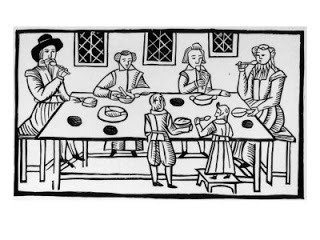 The Sabbath was a long day of preaching, punctuated by lunchat the meetinghouse—we'd call it a potluck or fellowship meal today. And whenfamilies came to church from some distance in the wagons, it wasn't practicalto go home for lunch. So the Sabbath dinners were a time to show off cookingskills.
The Sabbath was a long day of preaching, punctuated by lunchat the meetinghouse—we'd call it a potluck or fellowship meal today. And whenfamilies came to church from some distance in the wagons, it wasn't practicalto go home for lunch. So the Sabbath dinners were a time to show off cookingskills. When homes and outbuildings were raised, it was turned intoa community activity with men competing in carpentry and weight-lifting skills,and women competing with foods, or speed-sewing sprints.
Group dancing, particularly at weddings, was acceptable insome communities, but not usually between unmarried men and women. In someareas, though, the ministers condemned dancing as too frivolous for end-times,when people ought to be soberly aware of the impending apocalypse and judgment.
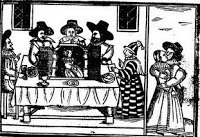 What about drinking? you ask. Alcoholic drinks wereextremely low in alcohol, about four percent. Everyone, including children,drank fermented cider, beer, ale, and wines, but usually not to excess. Privateparties combined with over-imbibing often led to fornication and adultery. Thosewho did become drunk and misbehave (sexual affairs, homosexuality, or violent behavior) were tried by their church, put in stocks, whipped, or inan extreme case, made to wear a scarlet letter D for a year. Overall, thepreference for mild alcoholic beverages probably saved many lives, consideringwater-borne illnesses and parasites. Distillation of spirits and the resulting concentration of alcohol and its effects came to Newport when the Caribbean molasses were refined there. Newport gained a reputation for drunken mariners and prostitution.
What about drinking? you ask. Alcoholic drinks wereextremely low in alcohol, about four percent. Everyone, including children,drank fermented cider, beer, ale, and wines, but usually not to excess. Privateparties combined with over-imbibing often led to fornication and adultery. Thosewho did become drunk and misbehave (sexual affairs, homosexuality, or violent behavior) were tried by their church, put in stocks, whipped, or inan extreme case, made to wear a scarlet letter D for a year. Overall, thepreference for mild alcoholic beverages probably saved many lives, consideringwater-borne illnesses and parasites. Distillation of spirits and the resulting concentration of alcohol and its effects came to Newport when the Caribbean molasses were refined there. Newport gained a reputation for drunken mariners and prostitution. But the joy in every New Englandman's heart came from sport fishing, in ponds, rivers, lakes, and the ocean,according to the author of Puritans atPlay.
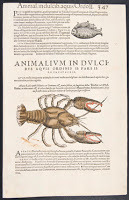 Fishing was both favorite pastime for men, and an importantindustry. Fishing, whaling, shipbuilding, and import/export of essential goodswere vital to the development of New England. Often,stores of fruit, vegetables, grain, and meat from the fall slaughters had runout before the summer harvests began, and the people turned to the disdainedfood of poor people: lobsters.
Fishing was both favorite pastime for men, and an importantindustry. Fishing, whaling, shipbuilding, and import/export of essential goodswere vital to the development of New England. Often,stores of fruit, vegetables, grain, and meat from the fall slaughters had runout before the summer harvests began, and the people turned to the disdainedfood of poor people: lobsters. 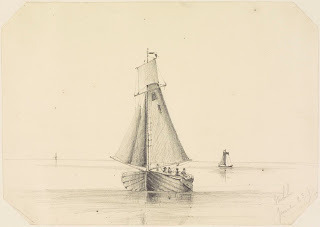 Fishing vesselWhen several failed harvests (at the peak of the Little IceAge), and the population explosion of the Great Migration combined to threatenwidespread famine and disease, Rev. Hugh Peter of Salem, Massachusetts, broughtthe bulk of fish processing and shipbuilding south, from French territories onCanada's east coast, to ports of Salem, Cape Ann, and Boston, thus enrichingthe economy of Massachusetts Bay for generations to come.
Fishing vesselWhen several failed harvests (at the peak of the Little IceAge), and the population explosion of the Great Migration combined to threatenwidespread famine and disease, Rev. Hugh Peter of Salem, Massachusetts, broughtthe bulk of fish processing and shipbuilding south, from French territories onCanada's east coast, to ports of Salem, Cape Ann, and Boston, thus enrichingthe economy of Massachusetts Bay for generations to come. How convenient that WilliamDyer was a dues-paying member of London'sWorshipful Company of Fishmongers! His nine-year apprenticeship in theprestigious guild was an advanced education in business management and foreigntrade, though surely he was extremely knowledgeable about fish! He and MaryDyer were among the co-founders of Newport, Rhode Island in 1639, a port that traded with Europe andthe West Indies. What did they export? Lumberfor shipbuilding, furs, horses, fish, and whale oil.
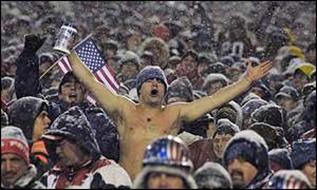 Colonial New England fun(sanctioned fun, anyway) was constructive and productive. It makes one wonderabout what they'd think of their successors and descendants, painting theirbodies in freezing weather and cheering for the New England Patriots, joyfully scrapping in hockey fights, orworshiping the Sox in their bikinis in the summer heat.
Colonial New England fun(sanctioned fun, anyway) was constructive and productive. It makes one wonderabout what they'd think of their successors and descendants, painting theirbodies in freezing weather and cheering for the New England Patriots, joyfully scrapping in hockey fights, orworshiping the Sox in their bikinis in the summer heat.
Published on October 03, 2011 21:28
No comments have been added yet.



